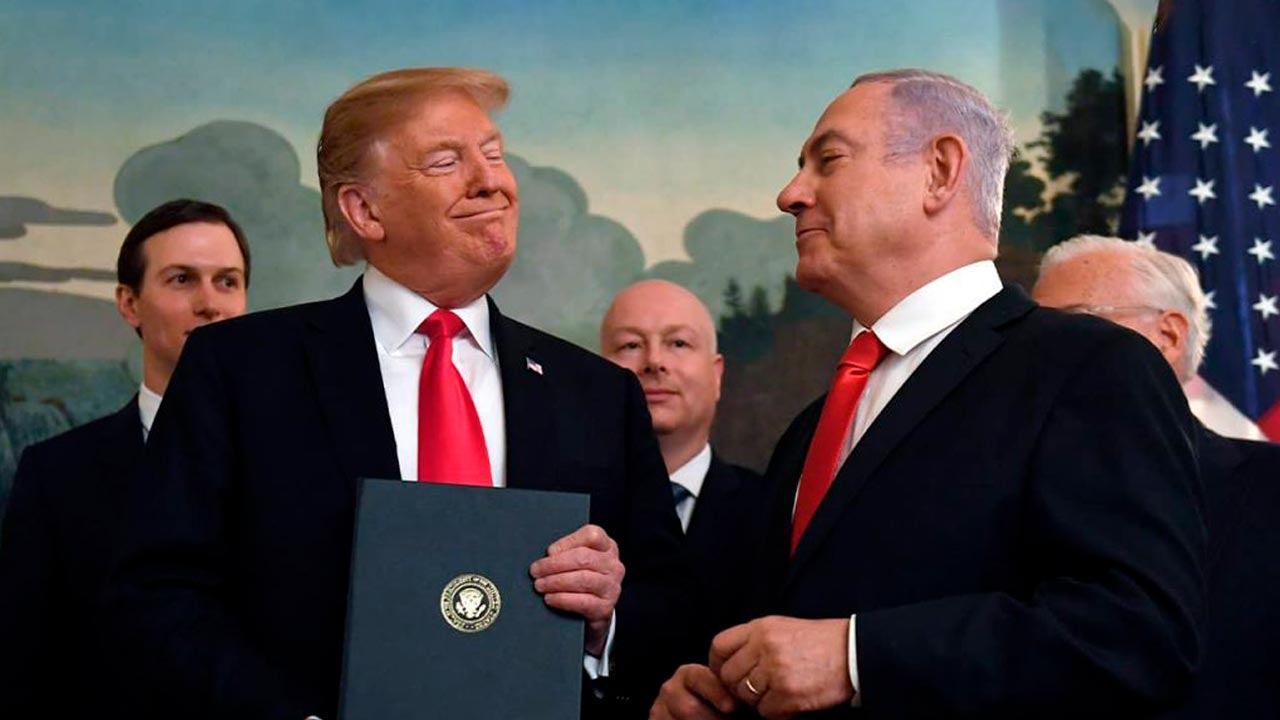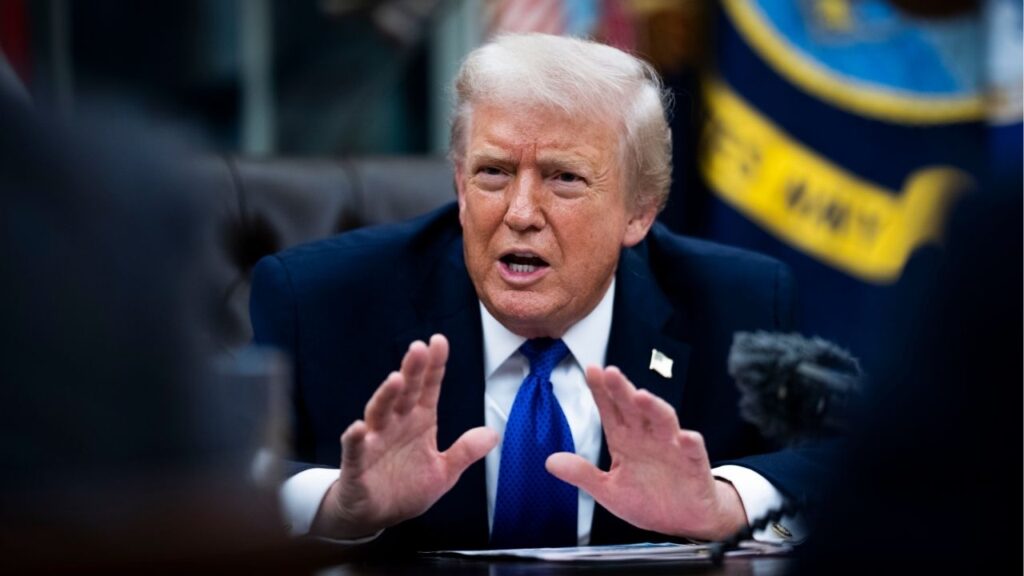In this April 7, 2019 file photo, a man walks by an election campaign billboard showing Israel's Prime Minister Benjamin Netanyahu, the Likud party leader, in Tel Aviv, Israel. As Netanyahu becomes Israel’s longest-serving prime minister, he is solidifying his place as the country’s greatest political survivor and the most dominant force in Israeli politics in his generation. (AP File)

- Israeli leaders celebrate Trump’s win, seeing it as favorable for Israel's security and foreign policy interests.
- Netanyahu expects reduced pressure on Israel from Trump, especially on humanitarian aid to Gaza and broader Palestinian issues.
- Biden’s final months may challenge Netanyahu, with aid tied to increased humanitarian efforts amid a “lame duck” U.S. period.
Share
|
Getting your Trinity Audio player ready...
|
JERUSALEM — Israel’s right-wing government celebrated Donald Trump’s victory Wednesday as if it had just won the U.S. election itself.
“Dear Donald and Melania Trump, Congratulations on history’s greatest comeback!” Israeli Prime Minister Benjamin Netanyahu wrote on social media soon after Trump’s victory speech.
“Your historic return to the White House offers a new beginning for America and a powerful recommitment to the great alliance between Israel and America. This is a huge victory!” the Israeli leader enthused, signing off, “In true friendship, yours, Benjamin and Sara Netanyahu.”
Itamar Ben-Gvir, Israel’s ultranationalist minister of national security, posted a festive “Yesssss” on social media, along with emoji of a flexed bicep and the Israeli and American flags, even before the last polls had closed in Alaska.
An overwhelming majority of Jewish Israelis view Trump as a better option for Israel’s interests than Vice President Kamala Harris. They assume he will go easier on Israel than the Biden administration, which has widely supported Israel’s war effort in the Gaza Strip over the past year but has also criticized the humanitarian aspects of it, including the high civilian death toll.
Netanyahu may now feel emboldened by the prospect of a more amenable U.S. president as he continues to insist on total victory in Israel’s wars and engages in a high-wire exchange of blows with its archenemy, Iran.
Netanyahu Fires Defense Minister
On Tuesday, Netanyahu fired his defense minister, Yoav Gallant, a main interlocutor with the Biden administration, against a backdrop of differences over ending the war in Gaza and over pressing domestic issues that were threatening the stability of Netanyahu’s governing coalition.
Trump has, like the Biden administration, called for Israel to wrap up the wars in Gaza and Lebanon that were set off by the Hamas-led terrorist attack against Israel 13 months ago, but analysts say a Trump administration would probably support ending them on terms more favorable to Israel.
That sentiment is largely based on Trump’s first term, when he bestowed political gifts on Netanyahu’s previous government, including moving the U.S. Embassy from Tel Aviv to Jerusalem.
Netanyahu may have been hoping that his swift congratulatory message Wednesday morning, before the final count was in, might erase Trump’s resentment over the congratulations Netanyahu offered President Joe Biden last time around, while Trump was still contesting the election result.
It is unclear how much the Republican Party’s most extreme factions will affect the foreign policy, or lack thereof, of the next administration, or how much influence the pro-Zionist Evangelist supporters of Trump will have. But in general, Trump has opposed doling out foreign aid, while Israel depends on U.S. military assistance to the tune of billions of dollars per year.
“There’s an illusion about Trump — that he doesn’t get into details or go deep, and supports Israel,” said Nachman Shai, a former minister from Israel’s center-left Labor Party. “But would Trump give $15 billion to Israel?” he said, referring to the military aid package signed by Biden in April.
“He says ‘You get, you pay!’” Shai said of Trump. Netanyahu, he added, favors Trump “because he thinks he is less interested in foreign affairs and will bug him less about letting more food into Gaza.”
Trump Said He Wants to End Wars
Trump has said that he wants to end wars, not start them, but he has not articulated any vision for an end game when it comes to Israel’s wars in Gaza and Lebanon, or for his approach to Iran. Alon Pinkas, a former Israeli consul general in New York, said Trump was likely to provide Netanyahu with a break from pressure to resolve the broader Israeli-Palestinian conflict, at least for a few months.
“For Netanyahu,” Pinkas said, “a president that doesn’t lean on him on the Palestinian issue is a good president.”
Between now and Trump’s inauguration on Jan. 20, however, lie Biden’s final months in office, a potentially perilous and challenging period for Netanyahu, since Biden will no longer be limited by electoral considerations.
A Nov. 14 deadline is looming for Israel to take specific steps to facilitate a significant increase of humanitarian aid into Gaza or risk a cutoff of U.S. military aid. The threat was laid out in a letter signed last month by Defense Secretary Lloyd Austin and Secretary of State Antony Blinken, and addressed to Gallant and Israel’s minister of strategic affairs, Ron Dermer.
“The two-month period may decide what kind of legacy Biden wants to leave,” said Shira Efron, senior director of policy research at the Israel Policy Forum, a New York-based research group. The Trump win could lead Biden to be “more adventurous,” she added, since he will not have to worry about complicating things for Harris.
At the same time, Biden will be in his “lame duck” period, and other than possible moves against Israeli policy at the United Nations, there are probably not many measures he could do that Trump could not potentially reverse.
–
This article originally appeared in The New York Times.
By Isabel Kershner
c. 2024 The New York Times Company
RELATED TOPICS:
Categories

Paramount+ Down for Thousands, Downdetector Shows


















